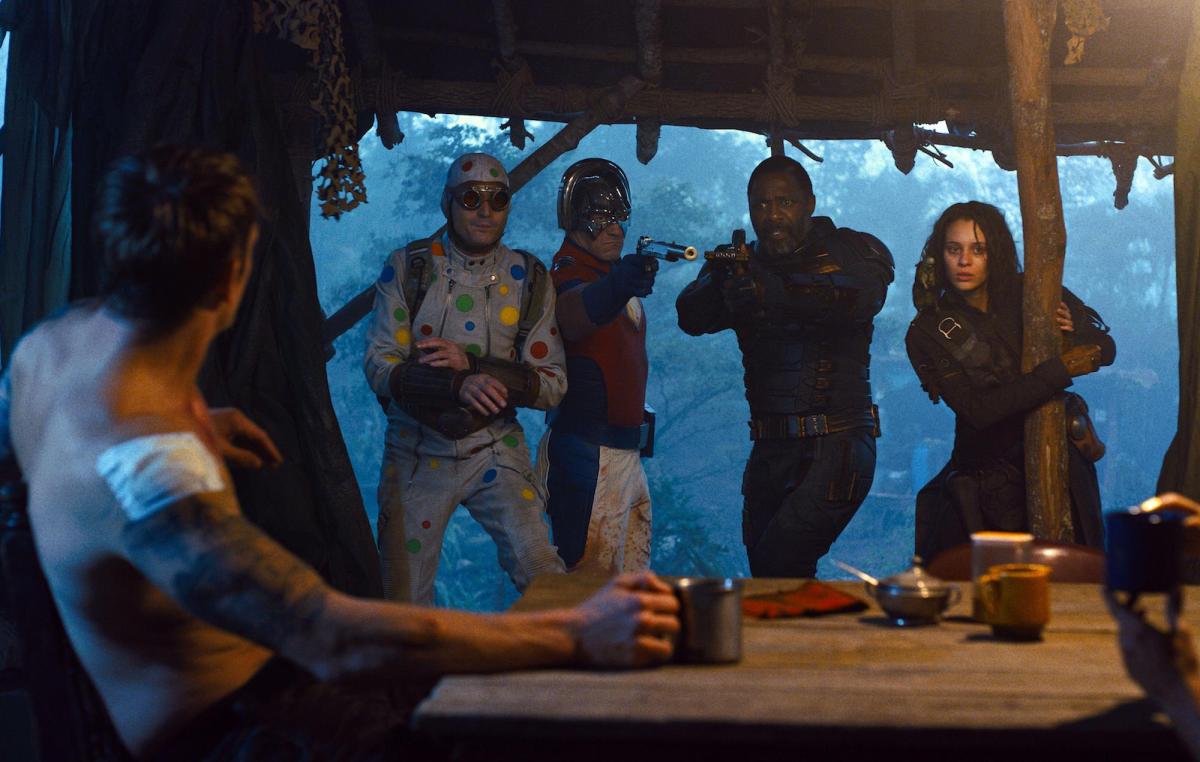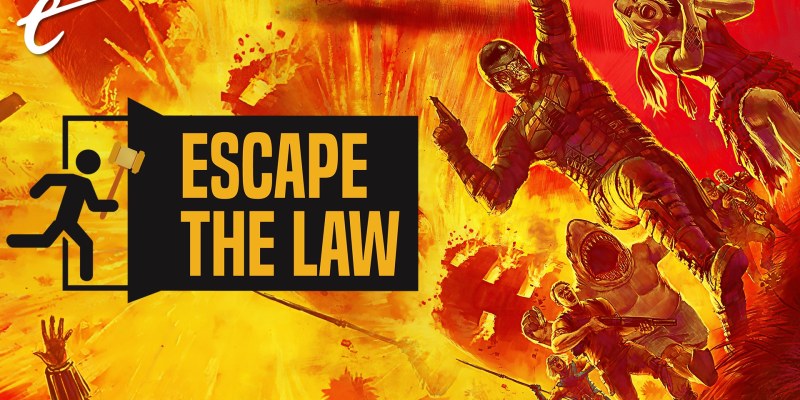In honor of James Gunn’s The Suicide Squad, which released this week in theaters and HBO Max, I will consider whether the suicide squad is or could be legal.
Suicide Squad has been adapted countless times, and Wikipedia cites seven comic volumes, three TV versions, two movies, and at least three video games, including Rocksteady Studios’ upcoming Suicide Squad: Kill the Justice League. But the essential ingredients are always the same: Take a group of convicted criminals, put them on a team, and send them on dangerous covert operations. To ensure the prisoners’ cooperation, the government offers both a carrot and a stick. The carrot: If you succeed, you’ll have time taken off your sentence. The stick: If you agree to join the task force, the government will implant an explosive device in your brain — if you disobey orders or try to escape, the government will activate the device and kill you instantly.
At first glance, it’s easy to conclude that something like the Suicide Squad would obviously be illegal. The reasons are myriad:
- It would allow criminals to avoid their prison sentences.
- It would allow felons to possess dangerous firearms, in violation of 18 U.S.C. § 922(g).
- Murder is illegal; implanting an explosive device in one’s brain (including those of criminals) would most definitely be unconstitutional.
- The Suicide Squad’s missions often involve the violation of U.S. law, the law of other countries, and international law.
While each of those objections is valid, a closer examination shows that the legal obstacles facing a real-world suicide squad are not as insurmountable as they may first appear. In fact, with a little creative thinking, we’ll see that the law provides a mechanism to overcome (at least in part) each of these obstacles.
Let’s take the objections one at a time:

1. It Would Allow Criminals to Avoid Their Prison Sentences
It doesn’t take a law professor to know that criminals shouldn’t be allowed to skip out on their sentences — especially the kind of dangerous criminal who would be on a suicide squad. The only problem with this argument is that criminals almost never serve out their entire sentences. In fact, over 90% of criminal defendants receive reduced sentences. While most reduced sentences are awarded as part of a plea bargain, it is not uncommon for convicted felons to receive a sentence reduction in exchange for cooperating with prosecutors in connection with other investigations.
Of course, there is a significant difference between serving as an informant and conducting full-scale military operations. But that difference, too, can be overcome. There are several instances in which judges or prosecutors have agreed to provide a defendant with a reduced sentence (or even no sentence) in exchange for military service. What’s more, there are several instances in which this practice has withstood legal scrutiny (“the fact that a soldier enlists reluctantly and to avoid jail does not make his enlistment void”).
Under today’s regulations, military recruiters are not allowed to offer or facilitate reduced or commuted sentences in exchange for military service. That’s no obstacle, however, since those regulations can be waived. In practice, it would be difficult to get the military to sign off on a suicide squad, but if the military were on board, there would be no legal obstacle.
As a final point, it’s worth noting that the government has the authority to institute a draft and require civilians to join the military — including innocent civilians with no criminal record. It stands to reason that if innocents can be compelled to fight, including in perilous, suicide squad-like settings like Vietnam, then we ought to be able to compel criminals to fight as well. And the Suicide Squad doesn’t even go that far, since it allows prospective squad members to choose whether or not they want to join the team.

2. It Would Allow Felons to Possess Dangerous Firearms
State and federal law prohibit felons from possessing firearms. However, those laws would not preclude felons from possessing firearms in other countries, and it would not take precedence over military operations.
If that weren’t enough, we could dodge the question by positing that members of our suicide squad would conduct their missions without firearms. In fact, that would be even more on point, as a no-guns suicide squad would make the missions even more challenging and perilous.
3. Murder Is Illegal
It’s true that murder is illegal… except for when it isn’t. Using advanced technology, the government can identify a specific target from miles away and can then use a precision drone strike to kill that target. During the Obama administration, the military killed thousands of people through drone strikes, including at least one American. This practice increased under Trump.
There is no legal justification for implanting an explosive device inside someone’s head. However, with today’s technology, there’s little meaningful difference between an exploding-brain chip and a GPS locator that can help a drone find its target. One could also argue that there is little distinction between a suicide squad member who goes rogue (as at the beginning of James Gunn’s movie) and an “enemy combatant” whom some would say can be targeted by a drone strike.

To be perfectly clear, there are many (including myself) who argue that this kind of drone strike is illegal — or at the very least, that the use of these strikes should not lie in the hands of any one person (be it the president or Amanda Waller). Nevertheless, two presidential administrations have used this tool without any meaningful legal reprecussions, so even if it is (or should be) technically illegal, it certainly would not stand in the way of our hypothetical suicide squad. The bottom line: One could, arguably, use drone strikes to kill a team member who goes rogue. However, one would not be able to use a drone strike against a team member who attempts to flee or otherwise stops cooperating.
4. The Suicide Squad’s Missions Are Illegal
Obviously, the specifics of this objection vary by the mission. Generally speaking, the reason why a mission gets assigned to the Suicide Squad in the first place is because it’s illegal and cannot be formally sanctioned (the good kind, not the bad kind) by the United States. If that’s true, then it follows that the suicide squad cannot operate lawfully.
But as with the previous discussion regarding murder, the fact that something is illegal in theory does not mean that it can’t work in practice. Whether we like it or not, international espionage is a way of the world. The United States does it. Russia does it. And you can bet that, if it were real, Corto Maltese would do it, too. The result: Yes, the missions are probably illegal, but not in a way that would prevent someone from building a suicide squad.

Bonus: Threatening Family Members Is Legal, Too
James Gunn’s The Suicide Squad has the government persuade one of the characters to join the Suicide Squad by threatening to charge his daughter with grand larceny (and as an adult) if he refuses. Believe it or not, this type of tactic is 100% legal.
As part of the plea-bargaining process, the government is allowed to use potential charges against a defendant’s loved ones as a bargaining chip. These kinds of arrangements are called “wired plea deals,” and they are legal so long as the government has sufficient evidence to charge the loved one with a crime. Thus, the government could say: “If you plead guilty, we promise not to charge your daughter with any crime. But if you do not plead guilty, we’ll charge her with grand larceny, and she could go to jail for up to 20 years.” Defendants have attempted to argue that this amounts to unfair and improper coercion, but courts have uniformly rejected that argument.
Bringing It All Together for a Real-World, Legal Suicide Squad
When we combine all the various elements, we can actually get pretty close to a fully legal version of a real-world suicide squad. As explained above, the result would not be a perfect recreation of the Suicide Squad, but it ought to be good enough.
One might have thought that providing a legal defense of the suicide squad was impossible. Indeed, one might think that any attempted defense would end in failure. But if we know anything about the Suicide Squad, it’s that even the most dire of missions can be completed. I am pleased to report that this mission has been a success. We can now deactivate my exploding-brain chip and confirm the reduction in my sentence. Maybe next time you’ll have a real challenge for me.
